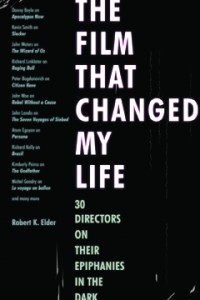Cross-posted on Extracriticum.com
On 7/25/11, I’ll be giving away a copy of The Film That Changed My Life to one lucky subscriber to this blog. So if you haven’t already, subscribe now. And remember you haven’t subscribed until you confirm via the confirmation e-mail, so check your bulk mail folder.
Robert K. Elder had a brilliant if somewhat sadistic idea: sit down with 30 filmmakers and ask them to name the ONE film that changed their lives. And hold them to it, interview them in a knowledgeable, professional and persistent way, let the filmmaker veer off momentarily, talk about how that film found its way into their work, but bring them back to that one film. (Elder lets two of the 30 choose two films, so clearly, he’s not a total fascist.)

The result is an entertaining and enlightening book, The Film that Changed My Life: 30 Directors on Their Epiphanies in the Dark. Here we have John Waters on The Wizard of Oz, Frank Oz on Touch of Evil, Bill Condon on Bonnie and Clyde, Peter Bogdanovich on Citizen Kane (no surprise there), George A. Romero on The Tales of Hoffman (big surprise there). Apparently, several filmmakers vied for what is arguably the best film about being a director, 8 1/2, but Henry Jaglom won because he called first dibs. Though I’m not a Jaglom fan, it’s fitting and he speaks intelligently about the film.
The interviews are arranged alphabetically by film, which makes for some nice juxtapositions. One of the more interesting is Seventh Voyage of Sinbad (the film that changed John Landis’ life) and Slacker (Kevin Smith). Landis talks about seeing the Harryhausen film as an eight-year-old boy at the Crest Theatre in Los Angeles, getting swept up in its stop-motion magic and realizing at that moment that he wanted make films. Kevin Smith treks in from New Jersey to see Slacker at the Angelica Theatre in Manhattan on his 21st birthday, is bowled over by the radical lack of plot and low-budgetness, and realizes he can make films. In fact, you could just about break these filmmakers into two camps, those who saw their life-changers as pre-adolescents or early adolescents and those who saw them in their twenties. Both ages seem to be highly receptive times for recognizing your life’s path.
In addition to age, context plays a big part in the power these films have over these filmmakers. Just as where you are in your life determines what you’re creating, so to where you are in life determines how you respond to a work of art. Hence the title of this post, a John Landis quote from his interview. This book proves that in spades. The first time Richard Linklater sees Raging Bull he relates to it because he’s an athlete and admires and understands the discipline exhibited by DeNiro’s Jake LaMotta. Later, when Linklater is no longer an athlete, his perception of the character changes, deepens, matures. Linklater the artist begins to see a multilayered film and not just a boxing movie. Arthur Hiller tells the most harrowing of the context stories. Assigned to a bomber during World War II, Hiller was miles above the destruction happening on Europe. After the war he returns to Toronto and sees Open City. Rome, devastated, truly devastated, is on the screen. Hiller, like a good filmmaker, doesn’t tell us what he thought or how he felt, but he set the scenario perfectly and we are left to imagine the rest. Open City must have hit him more powerfully than words can express.
I could go on and on, but really, it’s better if you just pick it up. It’s a quick, delightful read, perfect for anyone who loves movies. And the length of the interviews is just right (an average of 10 pages each, though I could have read 90 pages of Atom Egoyan on Persona), so, if you get a little impatient with Brian Herzlinger gushing about E.T.: The Extraterrestrial, you need only hang in there because before you know it, you’ll come to Alex Gibney speaking eloquently about the mystery of The Exterminating Angel. Of course you could jump around, but that’s not how I roll.
I would love to see a sequel. 30 more filmmakers, but also 30 playwrights on the plays that changed their lives, 30 painters on the paintings that changed their lives, etc. Reading what artists have to say about their moments of transcendence is endlessly fascinating.
Make sure to check out my previous post on Extracriticum, A Bit of the Old Ultra-violence, which features an excerpt from the book–John Dahl on A Clockwork Orange.
See also:
Five Documentaries That Influenced A Life’s Work
NARRATIVE Films that Influenced A Life’s Work
